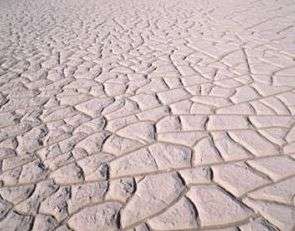Weather reports aid life-or-death decisions in Africa

(Phys.org) —The Africa Climate Exchange (AfClix), a University of Reading led project, is helping to bring vital drought and flood information to the people of sub-Saharan Africa.
When a failure of the monsoon rains brought severe drought in 2011 and floods submerged farms and polluted water supplies in 2012, AfClix was working hard with the US-funded Rainwatch project, Oxfam and Practical Action to warn of the impending dangers. This recent Afclix success is highlighted in a 'Perspective' article published today (16 June 2013) in the journal Nature Climate Change.
The people living in sub-Saharan Africa have a life-or-death dependency on information about the weather. Knowing when, where and what to grow or graze animals can be the difference between a bumper harvest and facing starvation.
Rainfall information is crucial. Sub-Saharan Africa depends more directly on rainfall than any other region on Earth, and yet has the fewest number of rain monitoring stations. There are also significant delays in the time between measurements being made and the resulting data being made available.
Rainwatch helps provide information in real-time, helping the Niger government to predict and react to the drought of 2011 and deluges of 2012, and informing NGOs and western governments with requests for international relief aid.
While the system, created at the NOAA Cooperative Institute for Mesoscale Meteorological Studies (CIMMS) at the University of Oklahoma, has been gathering data for several years and working in Niger, AfClix has helped extend its reach and broaden its application by putting the information into the hands of other African governments and NGOs such as Practical Action.
"Through AfClix, weather information from systems such as Rainwatch can mitigate humanitarian disasters by prompting officials to take action sooner," said lead author Dr Emily Boyd, reader in human geography, University of Reading.
"This was a great example of how these systems can work. It put information about the risks from extreme weather into the hands of the people who were able to do something about it."
Dr Ros Cornforth, Director of AfClix, is a researcher at the University of Reading's world-renowned Department of Meteorology and in the Climate Directorate of the National Centre for Atmospheric Science (NCAS-Climate).
She said: "There are communication problems between scientists and policy-makers all over the world. But in Africa the problem is particularly acute and, given the extremes of climate facing many people, particularly dangerous.
"By communicating directly with organisations and individuals on the ground, AfClix has been uncovering the issues that really matter to people, and matching them with solutions that can save thousands of lives."
Peter J. Lamb, director of CIMMS, said: "In the absence of more skilful weather and seasonal climate forecasts for West Africa, early warning systems can be constructed based on minimal cost monitoring and nowcasting, such as Rainwatch.
"This information could be a key to helping communities learn to adapt to an increasing and potentially irreversible global sustainability challenge."
More information: Boyd et al. Building resilience in the face of recurring environmental crisis in African Sahel, Nature Climate Change, 16 July 2013. www.nature.com/nclimate/journa … ll/nclimate1856.html
Journal information: Nature Climate Change
Provided by University of Reading


















